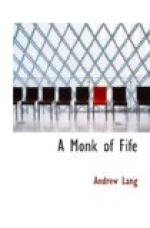I loved these manners little, but leave him I could not. His eye was ever on me; if I stirred in the night he was awake and watching me, and by day he never let me out of a bolt’s flight. To cut the string of his wicked weapon was a thought often in my mind, but he was too vigilant. My face was his passport, he said; my face, indeed, being innocent enough, as was no shame to me, but an endless cause of mirth and mockery to him. Yet, by reason of the serviceableness of the man in that perilous country, and my constant surprise and wonder at what he did and said, and might do next (which no man could guess beforehand), and a kind of foolish pride in his very wickedness, so much beyond what I had ever dreamed of, and for pure fear of him also, I found myself following with him day by day, ever thinking to escape, and never escaping.
I have since deemed that, just as his wickedness was to a boy (for I was little more), a kind of charm, made up of a sort of admiring hate and fear, so my guilelessness (as it seemed to him) also wrought on him strangely. For in part it made sport for him to see my open mouth and staring eyes at the spectacle of his devilries, and in part he really hated me, and hated my very virtue of simplicity, which it was his desire and delight to surprise and corrupt.
On these strange terms, then, now drawn each to other, and now forced apart, we wended by Poictiers towards Chinon, where the Dauphin and his Court then lay. So we fared northwards, through Poitou, where we found evil news enough. For, walking into a village, we saw men, women, and children, all gathered, gaping about one that stood beside a horse nearly foundered, its legs thrust wide, its nostrils all foam and blood. The man, who seemed as weary as his horse, held a paper in his hands, which the priest of that parish took from him and read aloud to us. The rider was a royal messenger, one Thomas Scott of Easter Buccleuch, in Rankel Burn, whom I knew later, and his tidings were evil. The Dauphin bade his good towns know that, on the 12th of February, Sir John Stewart, constable




